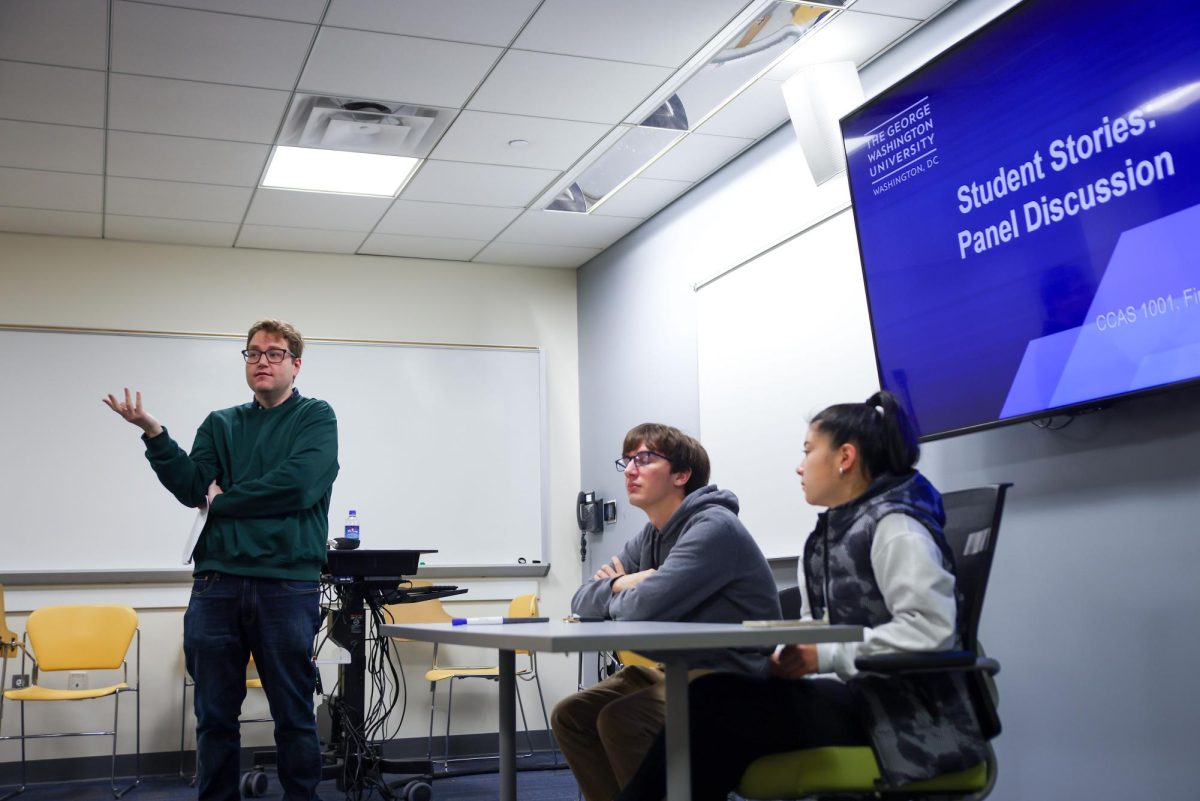One year after the Columbian College of Arts & Sciences launched a course exclusively designed for first-year students, officials altered the course to help students better engage with community resources.
CCAS First-Year Experience, or CCAS 1001, launched last fall as a required, one-credit pass/fail class for first-year students to learn how to structure their learning at GW, explore majors and minors, reflect on their own identities and learn about campus resources, according to the undergraduate academic advising page. CCAS Director of Undergraduate Advising Candace Sumner-Robinson said CCAS officials completed a curricular review of the 50-minute course this year and updated the coursework to include more lessons to encourage students to familiarize themselves with GW community resources.
Sumner-Robinson said CCAS 1001 underwent a “great deal” of changes after its first year to ensure the curriculum benefits students after taking input from students, instructors, administrators, advising staff, administrator and campus student services offices. The changes to the curriculum, which includes information on available student support and campus resources, give students more room for “reflection” and interaction with resources like the University’s library system, she said.
Sumner-Robinson said students from the fall 2022 and spring 2023 semesters provided feedback via forms administered to students and faculty on course content. She said students asked for the lessons to focus more on available student resources.
“A thorough review of the assignments and other curricular materials were evaluated by the coordinators of the course and thorough consultations were conducted by seasoned instructors within CCAS to ensure the effectiveness and timeliness of the information and resources shared with students to aid in their success and to support the instructors that lead each section of the course,” Sumner-Robinson said in an email.
Sumner-Robinson said officials adjust the number of CCAS 1001 courses offered based on the number of CCAS first-years. This semester, there are 76 sections of the course, compared to 86 in fall 2022, according to the schedule of classes.
CCAS Associate Dean for Undergraduate Studies Rachel Riedner said a committee of CCAS faculty and advisers designed the CCAS 1001 course to help freshmen adjust to college. She said the committee consulted the Center for Career Services and the GW Writing Center on the curriculum to see what academic and planning support new students need.
“The goal of the course is to introduce students to the CCAS and GW community, to engage students with valuable GW resources, and to give them practical information so they can successfully complete their degree,” Riedner said in an email.
Denver Brunsman, a professor of history and the chair of the history department, teaches one of the 76 sections of CCAS 1001 that the University offered this semester. Brunsman said he “jumped” at the opportunity to teach CCAS 1001 when officials asked if professors would be interested in instructing the class during its inaugural year last year and agreed to teach a section again this year because it is paramount that faculty orient and connect with first-year students.
“Orienting first-year students to the University is incredibly important,” Brunsman said. “I have kids who are about that age, a sophomore in college and a senior in high school, and I feel like I can relate on different levels to the students starting out and how important it is to make connections when you start at university.”
Brunsman said he has seen students utilize the resumes they have built in class when they apply for student worker positions in the history department. Brunsman added that there’s value in having students get to know and feel comfortable speaking with a faculty member in the class, which can strengthen their sense of belonging on campus.
“Students who don’t make it through their first year, and the number that drop out, the reason is often because they feel alienated or they don’t feel like they have a connection to anybody on campus, so if the class can help with that and provide someone, then I think it’s useful,” Brunsman said.
Brunsman shared the syllabi for his sections of CCAS 1001 he taught this semester and last year with The Hatchet. This year, CCAS officials added lessons on interviewing, helping students understand their goals and what brought them to GW, and time management to the course as well as a panel discussion with juniors and seniors in CCAS.
Aditee Sakhare, a first-year majoring in history, said she finds “certain parts” of the class useful, like creating a four-year plan. She said other aspects of the class, like learning about stress management, are useful to learn about but don’t feel productive in a classroom environment.
“I don’t really feel like going to a class for 50 minutes on Monday just to talk about stress management,” Sakhare said.
Sakhare said that while she wouldn’t take the class if it wasn’t a requirement, she’s grateful it is because the course informs her about opportunities available to her on campus. She said if she could change the program, she would make it more interactive by making the students move to the locations of the resources they are talking about.
“I feel like it’s trying to help us with being a first-year student at GW and kind of opening up our knowledge on the opportunities that GW has, which I think is pretty useful,” Sakhare said.
Gabriela Pobric, a first-year majoring in political science, said she does not find the course useful because she knows most of the course material through her own research already. She said she likes the instructor of the section of CCAS 1001 she’s enrolled in, Joe Strickland, because he makes the class engage with one another, which makes the time go by faster.
“All the information you could look up, like it’s just a Google away,” Pobric said. “It’s just a waste of time and the assignments are not worth it. It’s more just talking about yourself.”
Grant Pacernick contributed reporting.





